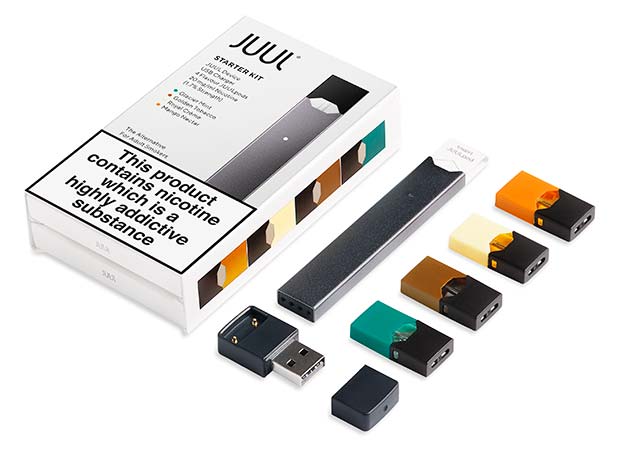The US e-cigarette maker JUUL Labs has seen extraordinary sales in the USA since it launched there, capturing 74% of the American e-cigarette market in just three years. Meanwhile JUUL went on sale here appropriately enough in July this year. It is currently in 700 vape stores and online, and has just been listed in Sainsbury’s. The Grocery Trader spoke to Dan Thomson, Managing Director of JUUL Labs UK.

“JUUL Labs is a relatively new company,” Dan explains, “set up by Adam Bowen and James Monsees, both graduates of the specialist NPD program at Stamford University in San Francisco.
“They had done the MA course and were really interested in the vaping category, as they were both smokers and wanted to quit. They looked at the opportunity at a high level, and found there were a billion cigarette smokers globally and tobacco was a trillion dollar business, but felt there had to be a better way to deliver the nicotine and the ritual of smoking.”
From there Adam and James spent the next 10 years and a significant chunk of money developing the business that became JUUL Labs. They eventually launched JUUL in the US in 2015, with a mission to eliminate cigarette smoking globally. Dan Thomson recalls: “It was a huge success, with nearly two million adults converting to JUUL.”
JUUL broke records when it became the fastest privately held company to hit the $10 billion mark and is now worth US$15 billion. Adam Bowen, the cofounder remains deeply involved in the company’s product development. “The next step,” says Dan, “was to deliver on the global vision, which is to sell outside the US and launch in other countries with big populations, large numbers of smokers, high cigarette prices and growing numbers of consumers caring about their health.”
First they launched in Israel, followed by a big launch here in the UK on July 17, and another launch in Canada in September. As UK MD for JUUL Labs, Dan Thomson has never worked in tobacco and insists he never would: “We’re here to put Big Tobacco out of business.”
It’s an important differentiating factor, with nearly all the big vaping brands in the UK owned by ‘Big Tobacco’:
“I’m sure their motives are sound for wanting to help people switch from smoking, but I’d be suspicious of their internal incentive structure.” Dan’s role as UK MD involves launching and running the UK business, including sales, marketing, public affairs and government relations.
“We’ve had a brilliant start to business here so far. Consumers are very receptive, with strong, positive feedback. This is a Next Generation Product with a difference and we’ve beaten all our targets. There’s also a receptive political and public health environment here. The tobacco control bodies have done a great job regulating cigarettes, unlike some countries where tobacco control has stalled.”
 Dan Thomson was a 20 a day smoker until he joined JUUL: “JUUL is really transformational, and I can vouch for it personally.”
Dan Thomson was a 20 a day smoker until he joined JUUL: “JUUL is really transformational, and I can vouch for it personally.”
Britain is a somewhat different market to the US, says Dan. Here we have the Tobacco Products Directive (TPD), which mandates advertising and the health claims e cigarette suppliers can make, as well as the relatively low nicotine strength per millilitre allowed here.
“The strength of the product we sell in the US wasn’t luck. We chose the most effective level based on research, but we comply with the level permitted, 59mg of nicotine in the US and in the EU 29 mg. There should be parity, but that said, our EU product is very effective for current nicotine users and light smokers.”
JUUL is fiercely independent and seeks no connection with Big Tobacco: “What’s unique about us is, lots of vape companies are very small. Before we came in, only Big Tobacco had our kind of scale. But unlike them, our founders set out to create a product to get people off cigarettes. It’s not for people who don’t use nicotine or are under age, it’s devised by adult smokers for adult smokers who want to switch.
“This is a relatively new market. A lot of businesses in retail and on the product development and distribution side were run by hobbyists. JUUL is here to professionalise the sector, which up to now only Big Tobacco has done.”
The target audience for JUUL in the UK is everyone who uses cigarettes across all ethnicities, gender and age groups. The JUUL ‘system’ has over 200 patents, but Dan says the core differentiating feature is its simplicity: “It’s very simple to use, the simplest design in the category. There’s a battery pack with a small, lightweight battery.
We have made it very clear that it doesn’t look like a cigarette. We wanted to get away altogether from the iconography of cigarettes. Also, the heating and temperature regulation technology we use means we can aerosolise the liquid at a lower, consistent temperature than other products.”
When it comes to quitting smoking, Dan says typical nicotine replacement therapies (NRT) have 5% efficacy, “but our data suggests up to 64% of our users completely stopped smoking by switching to JUUL.”
The e cigarette category is pretty restricted in how it can advertise, Dan says:
“You can do out of home advertising, cinema ads and direct mail, but so far we’re taking a conservative approach and only targeting adult smokers. We’re investing heavily in point of sale and taking on brand ambassadors, but not in above the line yet.”
The UK is well developed as a vape market, with 7.5 million smokers and 3 million vapers, a higher ratio than anywhere else:
“At any time 70% of smokers want to give up and are actively seeking the means to do it. If you can develop a great product offering at a competitive price point, smokers will find you. The category is very viral: smokers talk to each other, so the products sell virally.”
The urgent task to be done with the UK retailers, says Dan, is getting them to understand the category and the science behind it: “Even the bodies that are anti-smoking endorse vaping, including ASH and Cancer Research. Retailers generally don’t know enough about the products, so they aren’t very good at advising consumers. The vape shops are experts and much better at talking to people about switching.”
In Dan’s words it comes down to who’s willing to spend time with consumers:
“It needs education, and then more grocery retailers can upskill their staff. Ultimately we need to convert seven and a half million smokers to our products or competitor products. If we can get there, we’ll have done very well.”




Comments are closed.